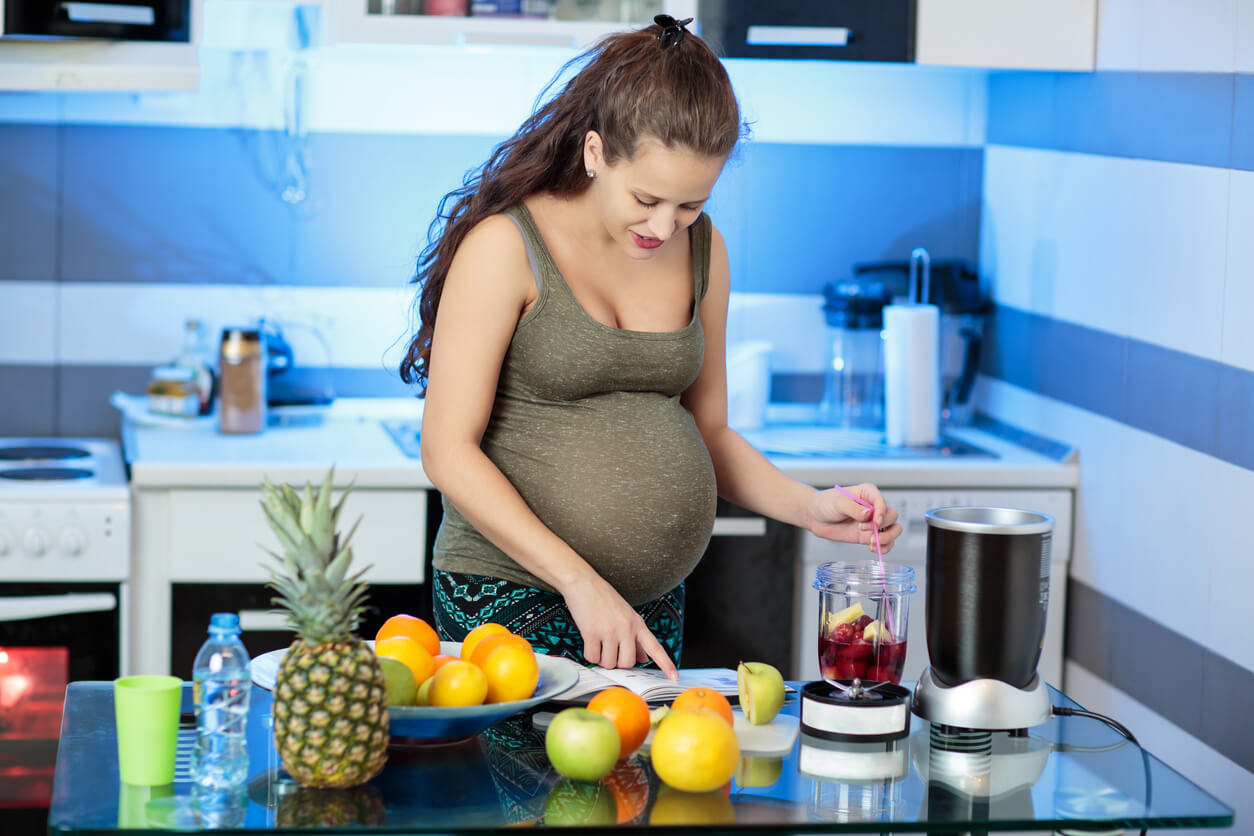Is It Safe to Eat Pineapple During Pregnancy?

Pineapple is a fruit that stands out for its ability to improve digestion and for its vitamin and antioxidant content. It’s therefore considered to be a high-quality food. In the following article, we’re going to show you if you can eat pineapple during pregnancy or if it’s dangerous both for the mother and for the fetus developing inside her.
First of all, it should be made clear that during pregnancy, it’s important for woman to optimize their diet. Sometimes, this means restricting the consumption of certain foodstuffs, as they can cause damage to development. Even certain products that usually appear in the diet, such as herbal teas, could be responsible for miscarriages.
The benefits of pineapple
Let’s start by reflecting on the health benefits of pineapple. First of all, we must talk about the diuretic properties of this food. It’s useful for reducing fluid retention, which is often associated with pregnancy. Thanks to this, the well-being and functionality of the woman can be improved.
At the same time, we’re talking about a fruit that concentrates a significant dose of vitamin C. This essential nutrient is responsible, among other things, for modulating immune function. Its consumption in sufficient quantities has been shown to reduce the incidence of infectious diseases. It also reduces the severity and duration of symptoms in case of infection.
Pineapple is also a good source of phytochemicals with antioxidant capacity. These elements neutralize the formation of free radicals and their subsequent accumulation in the body’s tissues. This mechanism is considered essential in order to prevent the development of chronic diseases, according to a study published in the Journal of Complementary & Integrative Medicine.
Finally, the positive effect of pineapple on the digestive system shouldn’t be underestimated. This vegetable contains a series of enzymes that facilitate protein breakdown. This makes digestion easier and lighter.

So, is it safe to eat pineapple during pregnancy?
As mentioned above, there are several benefits that the consumption of pineapple during pregnancy can offer. There’s no risk associated with eating this food on a regular basis. In addition, there’s no scientific evidence that warns of any contraindications associated with consuming this fruit during pregnancy. For this reason, it’s possible to include it in the diet.
Pineapple is also considered a very versatile food. It can be consumed on its own, although it’s also possible to eat it along with a fermented dairy product, such as yogurt.
It’s better to avoid pineapple in syrup
Although we’ve commented on the benefits of pineapple consumption, if it’s in syrup, then this is the worst alternative you can choose from. The intake of simple sugars is increased and could have a negative impact on blood glucose levels.
Special care should be taken with the consumption of short-chain carbohydrates in the case of women who’ve developed gestational diabetes. Otherwise, metabolic health could be adversely affected. The formation of the fetus could even be conditioned. Therefore, in the case of this disease, it’s crucial that you strictly follow the instructions of your doctor or nutrition professional.
Normally, it’s important to optimize the presence of fruit in the diet and ensure its consumption together with food with fiber and protein that delays the entry of glucose into the blood. This way, the benefits derived from the contribution of antioxidants are experienced without the risks of simple carbohydrate intake in the context of metabolic pathology.

Yes, you can safely eat pineapple during pregnancy
As you’ve seen, pineapple is a fruit that can be included in the diet during pregnancy. It has several benefits for women’s health and in no case will pose a risk to the fetus developing inside. However, variety is the spice of life. Therefore, it’s also advisable to alternate pineapple with other types of fruit to achieve a complete supply of antioxidants.
Finally, remember that it’s essential to ensure food hygiene standards during pregnancy. At this stage of life, food poisoning could be fatal for the fetus by causing a miscarriage.
All cited sources were thoroughly reviewed by our team to ensure their quality, reliability, currency, and validity. The bibliography of this article was considered reliable and of academic or scientific accuracy.
- Carr, A. C., & Maggini, S. (2017). Vitamin C and Immune Function. Nutrients, 9(11), 1211. https://doi.org/10.3390/nu9111211
- Hegazy, A. M., El-Sayed, E. M., Ibrahim, K. S., & Abdel-Azeem, A. S. (2019). Dietary antioxidant for disease prevention corroborated by the Nrf2 pathway. Journal of complementary & integrative medicine, 16(3), /j/jcim.2019.16.issue-3/jcim-2018-0161/jcim-2018-0161.xml. https://doi.org/10.1515/jcim-2018-0161
This text is provided for informational purposes only and does not replace consultation with a professional. If in doubt, consult your specialist.








